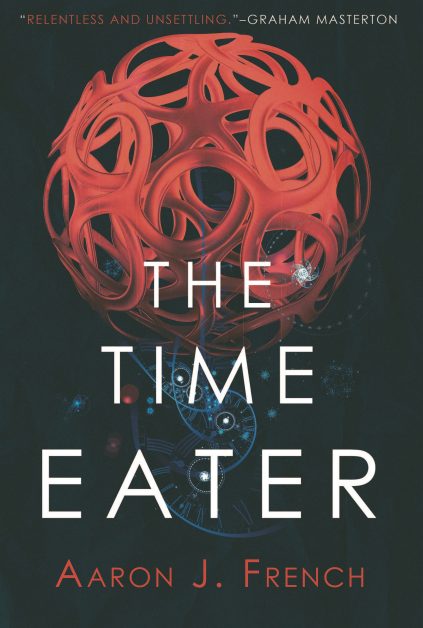The Time Eater
Aaron J. French
JournalStone
January 2017
Reviewed by Michael R. Collings
Aaron J. French’s first novel, The Time Eater, is a fast-paced quick read, a slice-to-the-soul excursion into identity, fear, and darkness. It adroitly blends elements of Poe and Lovecraft into an independent mythos centering on the Time Eater, an entity that exists outside of time and space and that, like an enormous black hole, ineluctably draws everything into its maw, beginning, including, and ending with Time itself.
And Time is the essence of French’s tale: lost time, time experienced but not remembered, time remembered but not experienced. It begins with a simple telephone call, and abruptly Roger Borough is thrust into a series of events that make him question himself, his memories, the basis of reality itself. And it encompasses nothing less than the fate of the universe.
A college roommates, James Steiner, is dying, and a mysterious woman named Annabelle asks Borough to be at Steiner’s side. Although the two have not spoken in years—not since the night of a scantily recalled ritual read from a book of arcane magic—Borough immediately responds…and just as immediately begins to wonder at his half-felt need to see Steiner. What he finds is a James Steiner wasted by a brain tumor, bed-ridden, flickering in and out of sanity, and at times apparently possessed by the Time Eater. To complicate matters, Borough’s experiences in the darkness of Steiner’s death-chamber include several women—or manifestations of women—from his life: Borough’s ex-wife; Steiner’s ex-wife; Steiner’s childhood friend, Annabelle, in whose house he is staying; and Norma, the kindly nurse assigned to oversee his death.
Two men. Multiple women. Complex relationships that include friendship and animosity, trust and mistrust, and sexuality open and repressed. Human psychology combined with visions of cosmic horrors that might be mere drug-induced delusions…or might not. And constant twists and turns in definitions of reality: the characters’ and the readers’. More than any book I’ve read in quite some time, The Time Eater resists the sense of final resolution until the final page, the final words.
The Time Eater is a well-conceived, well-constructed unity, designed to draw readers further and further into unnamed madnesses that spread with every page. Short enough to read in a single sitting, long enough to delve into intricate ideas and suppositions, it is engaging and impelling. Highly recommended.









